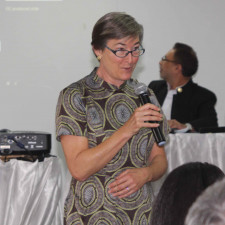Ministers and civil society debate Oceans protection

A Side Event on SDG 14, ‘Conserve and Sustainably use the Oceans, Seas and Marine Resources for Sustainable Development’ was held on the 23rd of May at the Dili Convention Centre.
The meeting, held in the sidelines of the Global Conference on the 2030 Agenda, attracted a ‘full house’ and featured a panel discussion moderated by the Minister of Foreign Affairs and Cooperation, Hernâni Coelho. The panel included Minister of State Estanislau da Silva, whose portfolio covers Economic Affairs, Agriculture and Fisheries, Constâncio da Conceição Pinto, the Minister of Commerce Industry and Environment, Dr. Sandra Whitehouse from the Ocean Conservacy and Sierra Leone’s Vice Minister of Finance and Economic Development , Momoh Vandi..
Minister of State Estanislau da Silva discussed the idea of using Timor-Leste’s under water resources in a way that was sustainable and benefitted the people. He noted that Timor-Leste’s waters suffered from extensive illegal fishing and explained that his Ministry was seeking assistance from NGOs and neighbouring countries to control the industry and reduce illegal fishing, particularly on the south coast.
Minister Pinto said that Timor-Leste had demonstrated its environmental awareness by its international actions including the signing of the Paris COP21 agreement. However, he noted, there was still a great deal of work to do. The Minister explained that a big initiative in this area, with significant impact on oceans, was the ‘zero plastics’ policy being discussed.
 Dr. Sandra Whitehouse made a presentation on the global problem of plastics in the oceans, now being consumed by the smallest marine micro organisms through to blue whales. She noted that a recent study that compared the fish caught and sold in California to the fish caught and sold in Indonesia found that in both locations, approximately 25% of fish had plastic in their gut. Dr. Whitehouse emphasized the importance of Timor-Leste finding solutions to plastic waste and pollution.
Dr. Sandra Whitehouse made a presentation on the global problem of plastics in the oceans, now being consumed by the smallest marine micro organisms through to blue whales. She noted that a recent study that compared the fish caught and sold in California to the fish caught and sold in Indonesia found that in both locations, approximately 25% of fish had plastic in their gut. Dr. Whitehouse emphasized the importance of Timor-Leste finding solutions to plastic waste and pollution.
Vice Minister Momoh Vandi agreed that a ‘zero plastics’ policy is an important step in the right direction and that an easy example is eliminating the use of plastic bags by replacing them with paper bags or reusable bags.
Last year scientists declared that some of Timor-Leste’s waters were amongst the most bio diverse in the world. These waters are important for developing the tourism industry. At the same time responsible and sustainable fishing practices are an important component of Timor-Leste’s policy to increase economic diversification for sustainable development.
The Oceans Side Event made a helpful contribution to an ongoing discussion about conserving oceans and sustainably using Timor-Leste’s marine resources.
The global importance of this issue and seeking out solutions and best practice will be the focus on The Ocean Conference to take place at the United Nations in June.










































